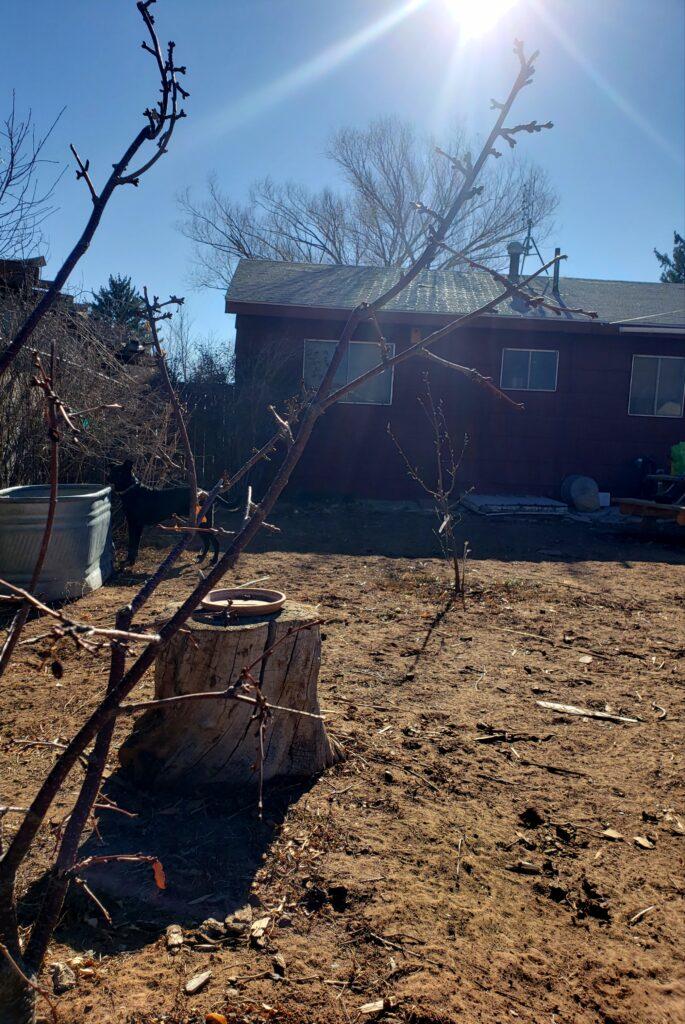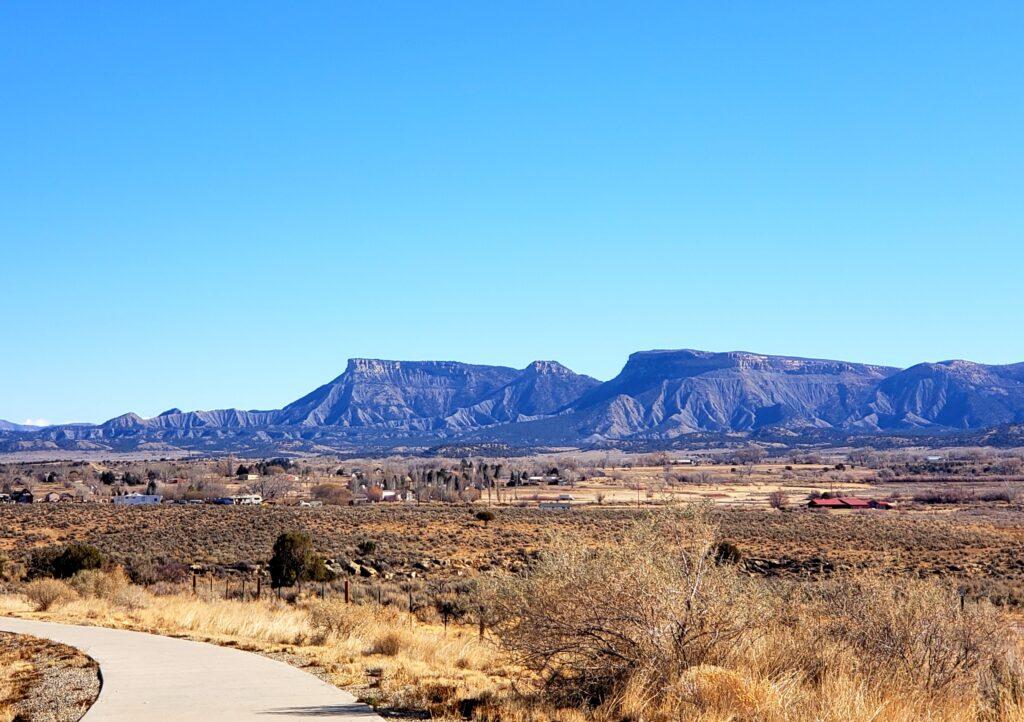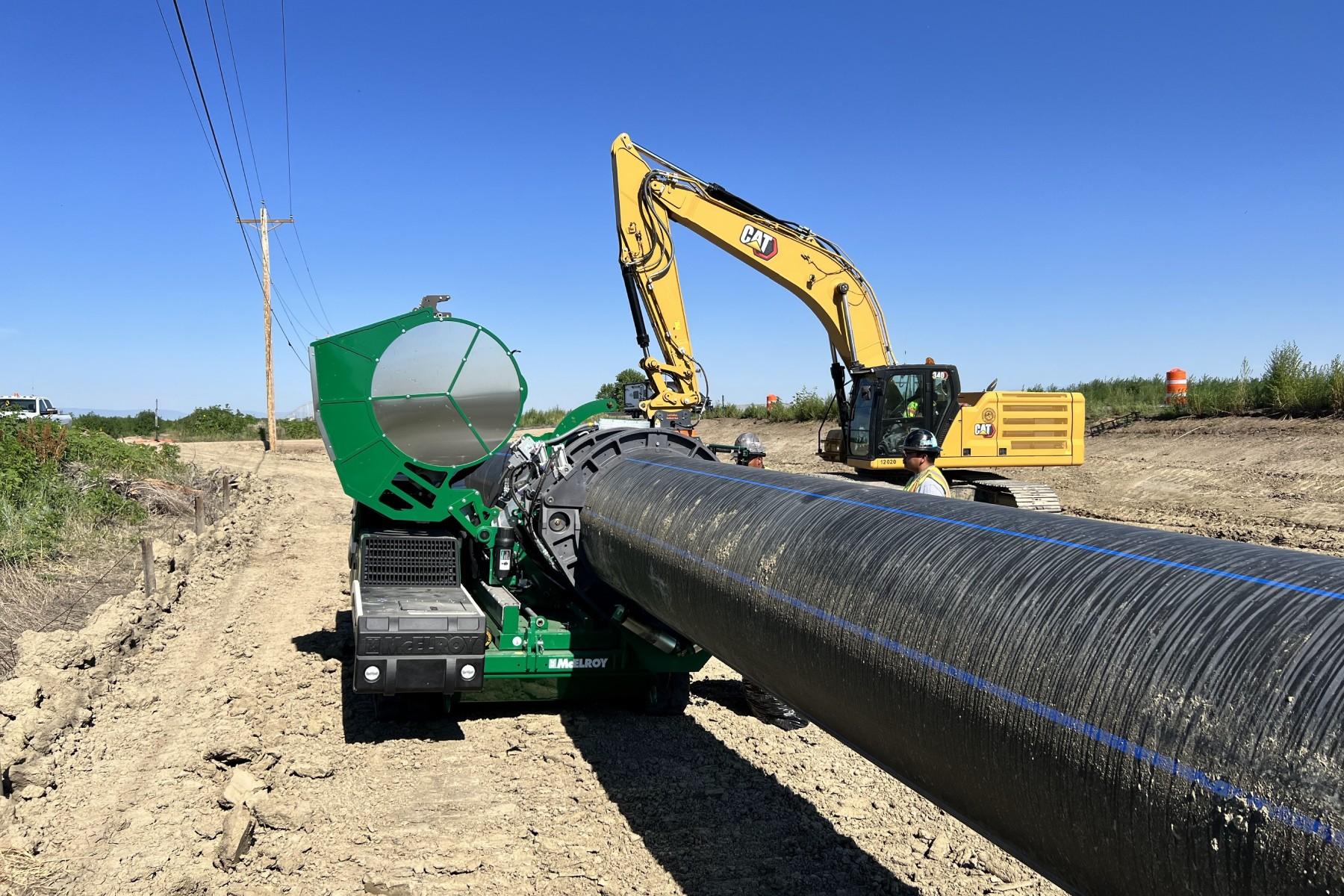
Erin Kuhlman's backyard is covered in fruit trees. Apple, peach and pear trees are mostly bare now, leaves scattered on the ground. Her dog, Bear, barks on and off at the birds foraging for food. In front of her are the La Plata Mountains, and to the south are mesa tops that form a long range.
Kuhlman moved to Montezuma County in the Southwest from Colorado Springs. She said it was both to escape the crowds and be closer to family.
"I just love the open country down here," Kuhlman said.
She has worked in the agricultural community since graduating from college. She now serves as the president of the Four Corners Farmers and Ranchers Coalition, a chapter of the Rocky Mountain Farmers Union. As president, she's seen how people have navigated multiple challenges since COVID-19 hit the state.
"If you go and plant a crop in March, and your whole world gets flipped around ... that's just so scary. That is just a scary bet to make," Kuhlman said.
It's made working through the season even more challenging.
"The end of the season is extremely difficult, because you're roasted, you're tired, and with that added layer of COVID fatigue, on top of the mental fatigue of being in the sun all day," Kuhlman said. "Still in the middle of a drought, no water, it's just compounding one after another after another."
Suicide rates for people in agriculture are higher than that of the general population
The agricultural community in Southwest Colorado is close-knit, and she said she makes sure her union chapter is a place people feel comfortable discussing their experiences. But these stressors affecting farmer's mental health are seen all across the state, including the Southeast.

There, Bruce Fickenscher works with farmers in his role as CSU Extension's Southeast area director. People come to the office for support on everything from research to consumer issues. Over the past few years, he's seen the first-hand effects of stress on those he works with.
"We had COVID, we had the markets, we had the droughts," Fickenscher said. "And out in this country, depending on who you talk to, we've been in drought for 20 years. So how long does it take for that to start affecting other issues, health, mental health, things like that?"
A CDC report from 2016 shows that the national suicide rate for people working in agriculture was more than double that of the general population.
Fickenscher said about two years ago, three people died by suicide in a short period of time in one community.
"It was just the realization that this is happening more often, maybe we need to make people aware of what's going on," Fickenscher said. "And our communities out here are pretty small. So when you have one, it affects the community. So when you have three, it really affects the community."
- If Ranching Wants To Survive Drought And Other Climate Hassles, It’s Time To Show Soil Some Love
- Colorado Agriculture Buckles Up For An Uncertain 2021 After A Challenging Year
- Record Drought Puts Colorado Farmers And Ranchers On The Front Line Of Climate Change
- ‘2020 Is Something I’d Like To Forget.’ Southern Colorado Farmers Adapt Through Coronavirus And Drought
A community effort to treat mental health
In response, he and the director of Southeast Health formed a group aimed at bringing mental health awareness and resources to the region. The group was made up of community stakeholders, like bankers, implement dealers and a livestock auction owner, who all provided different perspectives on agricultural stressors.
Southeast Health provides behavioral support through counselors and other treatment options, while the CSU Extension office staff were trained to identify potential issues through a patient health questionnaire called COMET.
COMET, or Changing Our Mental and Emotional Trajectory, was developed out of the High Plains Research Network and University of Colorado School of Medicine. Questions are conversational, often commenting on changing moods or behaviors over a period of time, and give people who aren't healthcare providers with the tools to connect others to resources.
If you need help, dial 988 to reach the Suicide and Crisis Lifeline. You can also reach the Colorado Crisis Services hotline at 1-844-493-8255 or text “TALK” to 38255 to speak with a trained counselor or professional. Counselors are also available at walk-in locations or online to chat.
"What we found was that if we can kind of pay attention and listen to these people when they come in, we can maybe help and direct them a little bit," Fickenscher said. "It's the undercurrent that you feel sometimes when you're used to talking to somebody in a certain way."
Like Kuhlman with the Four Corners Farmers and Ranchers Coalition, Fickenscher said it was important to him that people knew his office cared about their well-being.
"There is somebody out there that truly cares what happens to them and wants to help them," Fickenscher said. "We know we aren't going to prevent everything. But if we can prevent a few of them, we're making progress."
Fighting stigma is even harder in a pandemic
But undoing the stigma of reaching out for support, and building trust with a community, is long work. This is especially true during a pandemic that has increased mental health stress for people across the board.
That's one reason the Colorado Department of Agriculture has expanded rural mental health outreach this year. Commissioner Kate Greenberg said the department launched a rural mental health toolkit back in May, with materials in English and Spanish.
"It's always felt foundational, it's never felt peripheral to the rest of the work that we do," Greenberg said.
The toolkit gathers departmental resources from across the state to address mental health needs, including a partnership with the Colorado Crisis Hotline. Greenberg said the department has trained call takers on what it means to be struggling in an agricultural or rural community.
That, Fickenscher said, reduces barriers to folks getting help.

"It's that terminology that people use out here that probably aren't understood by everybody else," Fickenscher said. "What's a heifer? What's a bull, what's a steer? How much [does] a bushel of wheat weigh? You know, things like that."
Greenberg said the department wants to continue to address climate change, develop new markets and support future generations of producers.
"None of that can we achieve if farmers, ranchers, ag workers, aren't healthy, and that includes mental health," Greenberg said.
Colorado is one of a few states that has a mental health initiative at its department of agriculture, but Greenberg said they're sharing information with other states.
"We've been really excited when other states call us and say, 'Hey, we'd like to talk to you about your program,'" Greenberg said. "Minnesota has a great program, too. There is really good collaboration across states."
For Erin Kuhlman in Montezuma County, she sees mental health as an essential part of sustaining agricultural production in the state.
"There's not a lot of growers, and they're slowly declining," Kuhlman said. "It doesn't pay the greatest, but people that do do it, they know it's the right thing because people need to eat at the end of the day."
The Colorado Department of Agriculture plans to continue to strengthen relationships with public health departments and share tools available to help agricultural producers all over the state.








